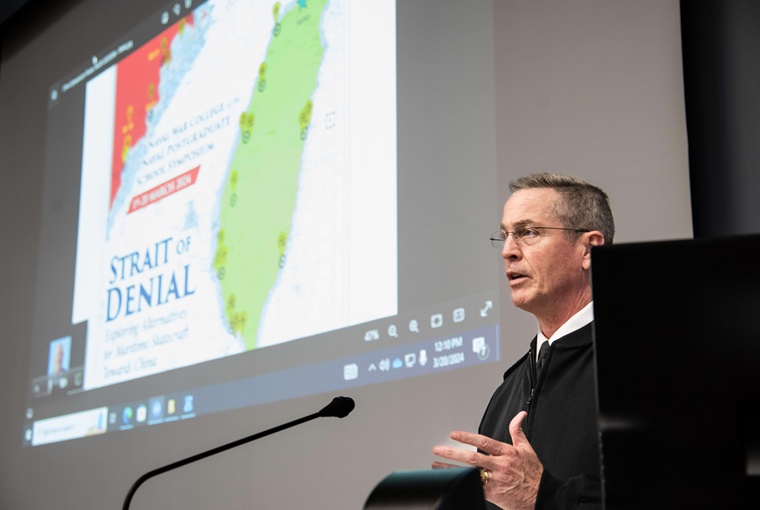U.S. Naval War College Hosts Symposium at Naval Postgraduate School to Address Integrated Deterrence on Maritime Statecraft

NEWPORT, RI – U.S. Naval War College (NWC) hosted Strait of Denial: Exploring Alternatives for Maritime Statecraft towards China, a symposium focused on integrated deterrence and the United States-People’s Republic of China (U.S.-PRC) great power competition at the Naval Postgraduate School (NPS) in Monterey, CA, March 19-20.
The event brought together members of the NWC and NPS community as well as representatives from various government and civilian organizations to explore how political, military, and economic aspects of maritime statecraft can enhance integrated deterrence in U.S.-PRC great power competition around the globe.
“I am energized by the teamwork between the Naval War College and the Naval Postgraduate School as we explore pathways for policymakers and military leaders to think through the strategic challenges that lie ahead with China,” said Rear Adm. Peter Garvin, president of NWC, in his opening remarks.
Strait of Denial included representatives from China Ocean Institute, the Royal Australian Navy, Carnegie Endowment for International Peace, the United States Institute of Peace, Defense Innovation Unit, Naval Surface Force Pacific, U.S. Pacific Fleet, Onyx Strategic Insights, Strategy Risks, and more.
The symposium featured a keynote address by Bruce Jones, Ph.D., author and senior fellow with the Strobe Talbott Center for Security, Strategy, and Technology in the Foreign Policy program at the Brookings Institution.
Jones noted that the most important role of naval power in statecraft has been to shape and secure the flow of trade and, as the world’s leading naval powers, the U.S. and China are both dependent on the flow of goods, energy, and data across the oceans.
“But shipping has been globalized, erasing the relationship between the ownership of shipping and the economics of cargo, complicating the relationship to naval power,” he stated. “Thus, integrated deterrence needs urgent rethought to honor the realities of maritime globalization.”
Robert Tomlinson, Ph.D., associate dean at NWC at NPS, offered that NWC’s presence at NPS sits on the shores of the Pacific Ocean close to the U.S. Indo-Pacific Command (USINDOPACOM) and close to where the U.S. faces its most important strategic competition – China.
“The synergy between NWC strategic studies and NPS science and technology education is a force multiplier in our joint force,” he said. “NWC has assembled a small but world-class faculty in strategic and regional studies, U.S. policy making, and operational art, and this China Symposium leverages all these unique capabilities for NWC.”
Workshop attendees participated in six panels with 24 speakers covering topics such as Economic Affairs and Maritime Statecraft; Political affairs and Maritime Statecraft, Military Affairs and Maritime Statecraft; China and the Global South; Technology, Innovation, and Maritime Statecraft; and a Senior Leadership Segment.
Panel segments enabled an in-depth understanding of integrated deterrence in the context of maritime statecraft and great power competition and provided opportunities for collaboration among officers and scholars from government and civilian agencies on latent threats and security implications related to the topic.
“The ocean is a necessary, dynamic domain and deterrence is a dynamic activity, so it’s important that our maritime statecraft be interactive to include accounting for Taiwan as a decision-maker and not an inanimate object,” said Yvonne Chiu, Ph.D., associate professor at NWC and symposium organizer. Chiu also emphasized the importance of recognizing the ways that China tries to deter the U.S. globally so that the U.S. can improve its own deterrence strategies.
The ceremony coincided with the graduation of 48 students from NWC’s College of Distance Education’s (CDE) at NPS, which included officers from the U.S. Navy, U.S. Marine Corps, U.S. Army, and U.S. Air Force.
NWC delivers excellence in education, research, and outreach, informing today’s decision-makers and educating tomorrow’s leaders. The college provides educational experiences and learning opportunities that develop students’ ability to anticipate and prepare strategically for the future, strengthen the foundations of peace, and create a decisive warfighting advantage.
